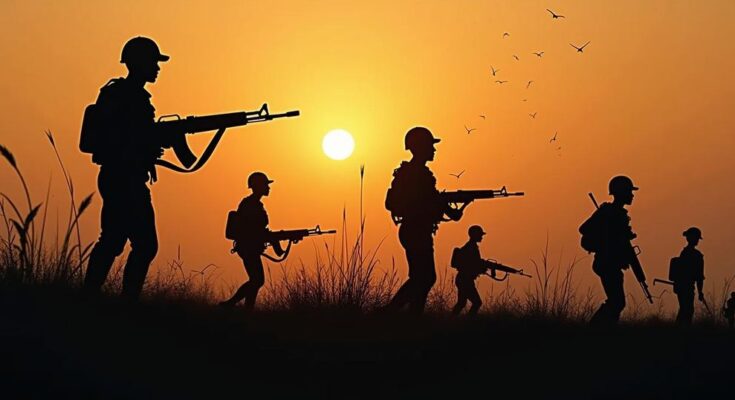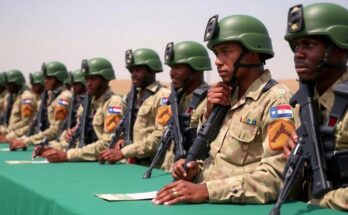Human Rights Watch (HRW) has released a report detailing serious civilian atrocities in eastern Democratic Republic of the Congo (DRC), linked to ongoing conflicts involving Rwandan forces and the M23 rebel group. The report highlights extensive violence against civilians, unlawful detentions, and alarming rates of sexual violence, calling for immediate investigations and humanitarian assistance for those affected.
On Thursday, Human Rights Watch (HRW) published a report detailing grave incidents of civilian atrocities occurring in the eastern Democratic Republic of the Congo (DRC), amidst ongoing military conflicts involving Rwandan forces and the M23 rebel group. The escalating violence has rendered local residents and over half a million internally displaced individuals increasingly susceptible to harm and humanitarian crises. The M23 is a Tutsi-led armed faction that has been historically supported by Rwanda, with its insurgency reignited in 2021. Allegations against M23 include heinous acts against civilians such as indiscriminate violence, sexual assaults, and the coercive recruitment of minors into their ranks. The situation is further complicated by Rwanda’s alleged backing of the group, despite persistent international appeals for a peaceful resolution. In North Kivu, where much of the conflict has been centered, displacement camps near Goma have transformed into veritable hotspots for violence. The Shabindu-Kashaka displacement camp in North Kivu has faced significant distress due to the ongoing strife. Reports indicate that in early April, rocket attacks from Rwandan military forces and the M23 caused the death of a 19-year-old and destroyed multiple shelter units. A follow-up attack on May 3 targeted the Lac Vert and Mugunga neighborhoods, resulting in the tragic fatalities of at least 17 civilians, including 15 children. HRW has brought attention to the perilous humanitarian conditions present in the Kanyaruchinya camp, revealing that Wazalendo fighters have unlawfully detained individuals while extorting money and valuables from them. Detainees endure confinement in makeshift holding facilities referred to as “kiboro.” Survivors have recounted harrowing episodes of violence and abuse. The report has also highlighted a disturbing increase in sexual violence cases, with survivors noting that their assailants often wore military uniforms. A staggering incidence of such crimes has been recorded, with survivor reports indicating rates of 50 to 100 cases weekly in particular camps, necessitating urgent protective interventions. It is crucial to note that sexual violence in wartime has been classified as a war crime. HRW asserts that the actions described in their report may constitute violations of international humanitarian law, specifically citing the Fourth Geneva Convention which aims to protect civilians during armed conflicts. Unlawful detentions and extortion practices may also be categorized as war crimes as delineated by the Rome Statute of the International Criminal Court. In response to these findings, HRW has urged both Congolese and Rwandan authorities to launch in-depth investigations and hold accountable those responsible for war crimes, especially pertaining to sexual violence, invoking the principle of command responsibility. Furthermore, HRW advocates for extensive humanitarian aid to all endangered civilians, encompassing legal, social, and medical support for survivors of sexual assaults. The organization emphasizes the imperative for both nations to formally endorse the 2022 Political Declaration on Strengthening the Protection of Civilians from the Humanitarian Consequences Arising from the Use of Explosive Weapons in Populated Areas. Lastly, HRW has underscored the necessity for the United Nations, the European Union, and other international bodies to rigorously oversee military assistance allocated to both parties, ensuring that it does not exacerbate human rights violations or diminish established human rights standards.
The Democratic Republic of the Congo has long faced turmoil due to armed conflicts with multiple factions, notably the M23 rebel group, which has historical ties to Rwanda. The region, particularly North Kivu, has witnessed significant violence, displacing thousands of individuals and creating dire humanitarian conditions. This situation has prompted increased scrutiny from international organizations like Human Rights Watch, which has documented the widespread impact of these conflicts on civilian populations, highlighting the need for urgent intervention.
In summary, the report by Human Rights Watch illuminates the severe atrocities faced by civilians in the eastern Democratic Republic of the Congo due to the ongoing conflict involving Rwandan forces and the M23 rebel group. The data presented emphasizes an urgent need for accountability and protective measures for the affected populations, as well as international involvement to ensure adherence to humanitarian laws. The situation calls for immediate action from both local authorities and the global community to address these human rights violations effectively.
Original Source: www.jurist.org




